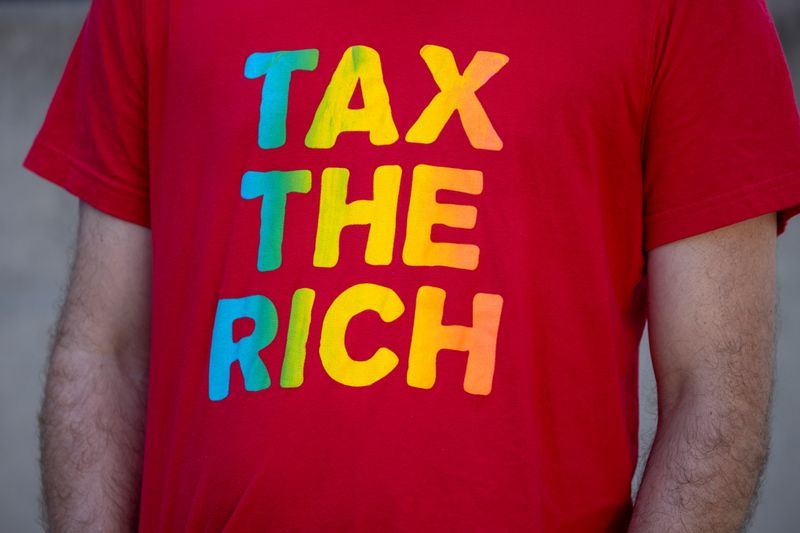By Elizabeth Dilts Marshall
NEW YORK (Reuters) -As Democrats in the U.S. House of Representatives look to advance https://www.reuters.com/world/us/white-house-eyes-us-house-vote-spending-bill-next-week-deese-2021-11-08 their $1.75 trillion social spending package this week, wealthy individuals are already planning ways to avoid paying for it.
The package would be the biggest expansion of the U.S. safety net since the 1960s, and Democrats propose paying for it by levying a 5% surtax on individuals with more than $10 million in annual income and an additional 3% tax on individuals with more than $25 million in annual income.
The White House says the new surtax could generate $230 billion to pay for the spending bill, but experts and bankers say that many individuals will find ways to avoid it and that it will raise less than an earlier proposal for a billionaires tax.
"Even though on paper the bill looks like it increases sharply the taxes on ultra-millionaires, in reality it's not going to have as much bite," said Emmanuel Saez, professor of economics at the University of California at Berkeley.
The proposed billionaires tax https://www.reuters.com/world/us/us-senate-democrat-unveils-billionaires-tax-biden-agenda-2021-10-27, targeting fewer than 800 people, commanded headlines in recent weeks and prompted the world's richest man, Elon Musk, to sell https://www.reuters.com/business/musks-5-billion-tesla-stock-haul-has-charity-circuit-buzzing-2021-11-12 $6.9 billion in Tesla (NASDAQ:TSLA) Inc stock last week.
That proposal taxed unrealized share gains, but it was ditched after moderate Democrats opposed the plan, arguing it unfairly targeted wealth creators.
The exact details of the bill that the House will vote on are not yet known. Bankers, lawyers and academics expect it to include the White House's proposal for the up-to-8% surtax, but not the billionaires tax.
The surtax is straightforward for wealthy taxpayers to plan around, said Alvina Lo, chief wealth strategist at Wilmington Trust.
"The goal is to get your modified adjusted gross income below the threshold and the tax does not apply," Lo said.
The billionaires tax, in contrast, "would have been very difficult to avoid," said Comerica (NYSE:CMA) Bank's national director of wealth planning, Lisa Featherngill.
That levy would have applied to individuals with assets worth more than $1 billion or who earned more than $100 million for three years straight. To avoid paying the tax, individuals would have had to reduce their income or assets by at least half.
"If you have a billion in assets, getting to $500 million is not easy," Featherngill said.
U.S. Senate Finance Committee Chairman Ron Wyden, author of the proposed billionaires tax, told reporters at the U.S. Capitol on Tuesday that he was still hopeful Democrats may yet adopt the levy to pay for expanding social programs and climate change initiatives.
Citing reporting by Reuters, he said: "There are economic experts saying that if you want to make sure you raise the revenue, go with the billionaires income tax."
S CORPS AND C CORPS
Some wealthy people are looking to bring their personal income below the $10 million threshold for 2022 by shifting earnings they receive through so-called S corporations or pass through tax structures to C corporations.
S corporations are popular with Wall Street investors and owners of private equity firms and hedge funds. That is because the structure allows them to declare their earnings from the business as personal income - avoiding the additional layer of corporate income tax.
In the proposed bill, S corps are taxed at a top rate of 48.8% at the federal level, and at over a 60% rate in California and New York when adding state income taxes.
By switching their S corporation tax structures to a C corporation, wealthy individuals should be able to keep their annual personal income below the $10 million threshold – although the downside is those earnings must be retained in the business, where they will pay a corporate tax of 21%.
STOCK SALES
Wealthy individuals are also selling stock this year before the surtax takes effect and planning to spread out future stock sales over several years to avoid hitting the $10 million-surtax threshold, bankers say.
Individuals will still pay capital gains and investment income taxes totaling up to 23.8%, but that is less than the 31.8% tax the highest income earners could pay next year overall if the spending bill is passed, Lo said.
It is not clear if Democratic lawmakers are aware of the potential loopholes.

Frank Clemente, executive director of Americans for Tax Fairness, said the tax surcharge was a "big improvement," but not enough.
"The millionaires surtax does not fix the problem of unrealized capital gains," he said. "The billionaires income tax, on the other hand, would solve the scandal of tax-free billionaires."